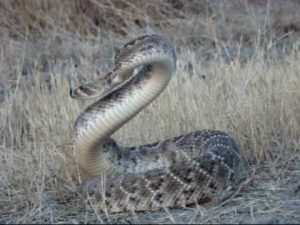
The Western diamondback rattlesnake or Texas diamond-back (Crotalus atrox) is a venomous rattlesnake species found in the southwestern United States and Mexico. It is likely responsible for the majority of snakebite fatalities in northern Mexico and the greatest number of snakebites in the U.S. According to the Arizona Sonora website there are two dark diagonal lines on each side of its face running from the eyes to its jaws. It has dark diamond-shaped patterns along is back. The tail has black and white bands just above the rattles. This species ranges throughout the southwestern United States (Arizona, California, New Mexico, Oklahoma and Texas)and northern half of Mexico.
Western diamondbacks are pit vipers. This means that they have a heat sensing pit (loreal pit) located behind each nostril that can detect differences in temperature, sometimes differences that are only a fraction of a degree apart. The heat given off by an animal is detected by the snake helping it to determine predator from prey. This snake is considered a generalist, which means that it isn’t too picky about its habitat. It can be found living in deserts, grassy plains, forests, rocky hillsides and areas along the coast. It lives in elevations from below sea level up to 6500 feet (2000m). They eat Mice, rats, rabbits, gophers, ground dwelling birds, lizards and other small animals.
Fun facts
- These snakes can live approximately 15-20 years in captivity.
- The rattle of the rattlesnake is made up of a protein called keratin (the same protein that your hair and fingernails are made of). A new segment is added each time a rattlesnake sheds, but they can shed at different rates. Because of this, and the fact that segments can break off, you really can’t tell a snakes age by counting the segments.
- A rattlesnake can move its rattle back and forth 60 or more times per second.
Source: http://www.selfreliancecentral.com
No comments:
Post a Comment